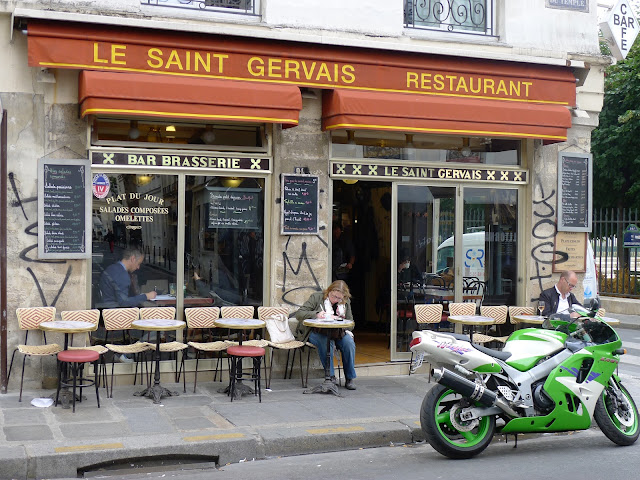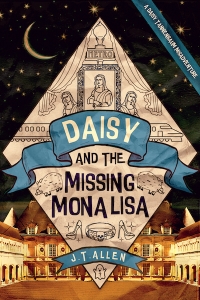6. Le Saint Gervais
Nov 22, 2021 by Mr. Allen
 We metroed back to Aunt Mill’s neighborhood and ate at a place called Café Saint Gervais, around the corner from Mill’s apartment. She talked with both owners of this place. They were like best buddies. They even shook my hand and the woman patted my hair and kissed my cheeks and spoke English to me, telling me that her name was Rose and my name was Daisy, which meant Marguerite in French, so we were both flower-name girls, the best kind of girls in the world, and that if I ever needed anything, or was hungry, or wanted to get out of the rain, or wanted a chocolat chaud, or anything, just anything, I should stop in and ask for Rose.
We metroed back to Aunt Mill’s neighborhood and ate at a place called Café Saint Gervais, around the corner from Mill’s apartment. She talked with both owners of this place. They were like best buddies. They even shook my hand and the woman patted my hair and kissed my cheeks and spoke English to me, telling me that her name was Rose and my name was Daisy, which meant Marguerite in French, so we were both flower-name girls, the best kind of girls in the world, and that if I ever needed anything, or was hungry, or wanted to get out of the rain, or wanted a chocolat chaud, or anything, just anything, I should stop in and ask for Rose. It wasn’t a fancy place. It was frayed and beat, but not antique-looking, like a lot of places in Paris, unless you think of plastic furniture from the 70’s as antique. But Madame Rose knew how to cook. We had saumon rillettes and gratin dauphinois and rôti d’agneau aux herbes and choux vert aux lardon and then figues chaude à la mousse d’amandes. I remember all that because Madame Rose wrote the names of everything down when I asked her to. She was excited that I was excited about the food, but who wouldn’t be—it was so amazing. Aunt Mill ordered a whole bottle of wine and filled my glass. I told her I was just a kid and didn’t drink wine, but she said that kids in France could drink a little wine under adult supervision and that it was a shame not to drink wine with such a good meal.
We talked about everything under the sun, and even though it was cold and raining outside, everything seemed just fine. Aunt Mill asked me to tell the whole story about Lucia and Martin Blidenbock, including about punching Martin, so I did, and she laughed. “Good for you. Unofficially of course,” she said. She started talking about crazy things that she and my mom did when they were young but she made me swear never to tell anyone. I had no idea my mom was such a terror.
At the end of the meal, when we were stuffed to our eyeballs and Aunt Mill was drinking an espresso, she pulled out the scores from the tests I’d taken. She looked them over for a long time, sighing once in awhile. Finally she set them down and said, “a French scholar you are not, mademoiselle.”

